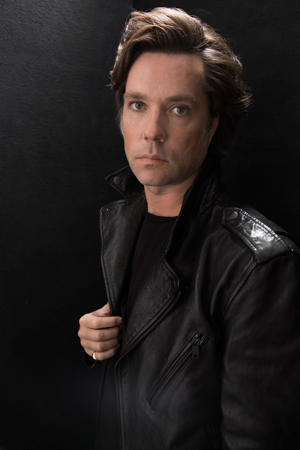On a warm summer evening on an estate in Bridgehampton, beneath a circus tent brimming with well-heeled merrymakers, flutes of Moet effervescing in hands sticky with cotton candy, Grammy-nominated Canadian singer and composer Rufus Wainwright was auctioned off for $20,000. He came with a month’s lease on a Steinway piano.
“Will the piano go to Chicago?” the high bidder shouted to the auctioneer at the annual Hamptons Happening fundraiser for the Samuel Waxman Cancer Research Foundation. There was momentary uncertainty at this. Would Wainwright now need to travel to Chicago, a supreme sacrifice for the peripatetic performer? And what would it cost to ship a six-figure piano of some delicacy from Long Island to Illinois? The overly generous bid seemed to erase any doubt. “Sold!”
Having done his philanthropic duty, Wainwright, bearded and dressed in a red Prada coat, lingered on the stage before the audience of several hundred. Hamptons crowds are capricious. They are practically guaranteed to move on to some competing party in search of fresh faces and fresher drinks unless there’s some kind of sexy payoff worth hanging around for. So Wainwright moved to the Steinway and gave it to them.
“This song, you may have heard it. It’s from a very small independent film called ‘Shrek,’” Wainwright said, with a lisp that belies his confident tenor.
“Well I heard there was a secret chord/That David played and it pleased the Lord/ But you don’t really care for music, do you?” he sang, rolling his head from side to side in reverie. Mock reverie? It was hard to tell.
between indie and mainstream.”

“Hallelujah,” his cover of Leonard Cohen’s ethereal ballad that was prominently featured in the 2001 DreamWorks film ‘Shrek,’ probably haunts Wainwright. It’s given him the truly mainstream recognition that every artist craves to so
me extent. It’s also associated him in the American collective unconscious with an animated green ogre.
Still, he isn’t complaining, just attuned to the irony.
“I know, bringing cigarettes to a cancer benefit is … ” Wainwright told LLNYC, lighting a smoke in the darkness outside the tent after his performance.
“They offered me this gig tonight, and at first I was pretty trepidatious because August is verboten,” he said, referring to his habit of taking the summer month off. “But once the word ‘cancer’ pops up I get extra-sensitive, because my
mother, the late, great Kate McGarrigle, passed away from a rare form of cancer called sarcoma. [The Waxman foundation] very, very generously offered to donate $100,000 [to sarcoma research] and start a fund in my mother’s name, so I couldn’t refuse.”
Bill Sullivan, the executive director of the Samuel Waxman Cancer Research Foundation, told LLNYC that thanks to Wainwright, the foundation had its most successful fund-raiser to date, bringing in roughly $475,000 for cancer research.
“It was a great honor to be asked in the first place,” Wainwright said.
He typically spends the month of August on the East End, basking in the sun at his Montauk home with his husband, Jörn Weisbrodt, and his daughter, Viva Cohen, whom they raise in a “parenting partnership” with Lorca
Cohen, daughter of Leonard Cohen. The rest of his time is spent in a flurry of musical creation.
In July, he toured Europe. His second opera, “Hadrian,” about a Roman emperor known for actually building a wall, will premiere in 2018 in Toronto with the Canadian Opera Company.
“Interestingly enough, opera is a more potent force now than ever, because pop music has become so commercialized, mechanical and formulaic. Opera is one of the places where you can go and hear live music just for the love of the art. I mean, no one is making a fortune,” he said. “Once people slip into opera, they never really get over it.”
“I walk a thin tightropeAfter releasing nine studio albums that seem to move further and further from the mainstream — in 2016, he released an album of adaptations of Shakespeare’s verse entitled “Take All My Loves: 9 Shakes
peare Sonnets” — he said he continues to compose pop music.
“I take these vacations into the opera world in order to reinvigorate my enthusiasm for the mainstream,” he
said. “So I am excited to see what the kids are up to after I pacify the adults.”
It’s an eclectic career, but it doesn’t fall far from the family tree.
Music was a pre-existing condition for Wainwright, who was born in Rhinebeck. His father, folk singer Loudon Wainwright III, who also fathered a child by singer Suzzy Roche, has released 26 studio albums. His mother, also a folk singer, released 12 of her own. At 13, Wainwright began touring with his mother and his aunt Anna McGarrigle. It was a notoriously fraught childhood, later captured in his song “Dinner at Eight” and by his sister, singer Martha Wainwright, in her song “Bloody Mother Fucking Asshole.” But by his late teens, Wainwright was already establishing himself as a breakout solo artist, and in 1998, Rolling Stone recognized him as the Best New Artist of the year for his self-titled debut album.
That first album was written in Los Angeles, where he still keeps a home, but his second album, 2001’s “Poses,” was composed in New York’s legendary Chelsea Hotel. His room, just behind the hotel’s neon “E,” was known as an after-hours hangout. It’s also where he became addicted to meth. But New York also left a positive imprint on his career.
“I had a great classic New York period,” he said. “I used to do a lot of blow with Alexander McQueen. But that is sort of run-of-the- mill, I guess.”
